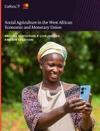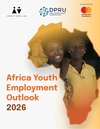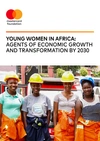Driving Sustainable Livelihoods and Job Creation
Agriculture is central to the economies of Côte d’Ivoire and Benin, providing livelihoods for the majority of the population and underpinning national food security. Yet gaps in formal support systems persist, and youth and women continue to face barriers to accessing land, finance, extension services, and cooperative leadership. These barriers leave many excluded from opportunities to improve productivity or enhance their livelihoods.
Against this backdrop, digital practices are reshaping how farming, processing, and trading take place. Social agriculture—the use of social media to exchange information, access markets, and build communities—has emerged as a defining feature of this transformation. WhatsApp groups have become vital channels for coordination and advice. Facebook pages now serve as storefronts, enabling visibility far beyond local markets. TikTok and Instagram are bringing local produce and new farming techniques to wider audiences, with youth often at the centre of digital storytelling. For many agripreneurs, these platforms are more than communication tools—they are extensions of advisory systems, marketplaces, and communities.
This report builds on Caribou’s earlier studies of social agriculture in Kenya, Nigeria, Ghana, and Senegal, extending the analysis to Côte d’Ivoire and Benin. Drawing on interviews, focus groups, and regional desk research, it examines how youth and women are navigating digital opportunities, the barriers they encounter, and the ecosystem conditions that shape their participation. It highlights the ingenuity with which agripreneurs adapt mobile-first tools to their realities, the informal networks that fill gaps left by formal systems, and the new types of work emerging as digital practices evolve.
Insights
- Adoption: Social agriculture is reshaping youth engagement in farming, but ecosystem barriers limit reach. Young people are using WhatsApp, Facebook, and TikTok to promote products, exchange knowledge, and connect with buyers. Smartphone penetration, high data costs, and gendered constraints mean adoption remains uneven, especially in rural areas.
- Skilling: Digital skills are expanding through peer-led learning, but training ecosystems remain uneven. Agripreneurs are gaining practical competencies—taking product photos, managing online sales, or experimenting with mobile payments—often through trial and error or peer coaching. Formal training remains largely urban and assumes a level of digital confidence that many women and rural youth do not yet have.
- Ecosystem: Formal support structures are adapting slowly, leaving gaps filled by informal networks. Traditional extension services, cooperatives, and national training institutions struggle to keep pace with digital change. In their absence, agripreneurs have built online communities and peer groups that now play critical roles in knowledge exchange, trust-building, and even resource pooling.
- Monetization: Financial pathways are widening, but ecosystem exclusions constrain platform use. Agripreneurs are using mobile money, crowdfunding, and community trust networks to mobilize finance. Barriers to formal platform monetization in francophone West Africa—combined with weak integration between social media and financial systems—limit broader participation.
- Trust: Credibility and risk management are central, shaped by social norms and fragile digital infrastructure. Social media opens new markets, but fraud, misinformation, and harassment remain major risks. Agripreneurs manage these challenges through transparency, reputation, and collective monitoring, showing how trust continues to underpin digital exchanges.
- AI: Emerging tools are opening possibilities, but ecosystem readiness remains limited. Urban agripreneurs are beginning to test AI for branding, marketing, and customer interaction. While these tools hint at future opportunities, they often remain ill-suited to the realities of informal, mobile-first economies.
Policy and Program Implications
- Governments and policymakers should formally recognize social agripreneurs in agricultural and digital economy strategies, expand mobile-friendly identity and financial systems, and strengthen consumer protection in digital markets.
- NGOs, training institutions, and development partners should scale peer-led training and mentorship models, ensure women and rural youth are included in user testing and tool design, and invest in accessible digital safety and financial literacy programmes.
- Research institutions should deepen evidence on social agriculture’s economic impact, test innovative approaches such as community financing and AI-enabled advisory, and ensure insights are made accessible to practitioners and policymakers.
- Farmer groups and cooperatives should build collective digital presence, pool resources for shared visibility, and formalize peer training roles that are already filling extension gaps.
- Private sector actors, including platforms and agritech companies, should adapt products to the realities of informal digital economies, reduce barriers to platform monetization, and develop partnerships with local trainers and farmer groups.
Call to Action
By connecting digital innovation with the lived experiences of young agripreneurs—particularly women and rural communities—social agriculture can become a powerful driver of inclusive employment, food system resilience, and digital participation across WAEMU. Coordinated investment, recognition, and policy support are now essential to ensure this potential is realized.




